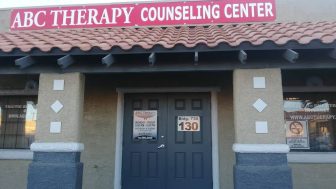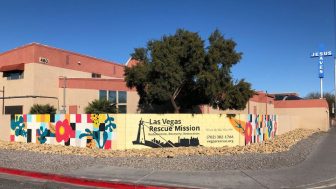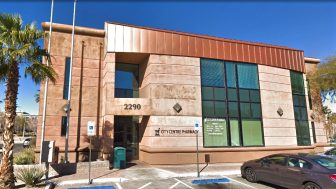The Salvation Army Las Vegas Adult Rehabilitation Center
211 Judson Ave
North Las Vegas, NV 89030
About The Salvation Army Las Vegas Adult Rehabilitation Center
The Salvation Army's Adult Rehabilitation Center provides residential addiction treatment to adults from ages 21 to 65, regardless of their backgrounds. In addition to helping folks beat back their addictions, they also provide job training and basic necessities to help you get back on your feet physically, emotionally, and spiritually. You'll find 'em out in Las Vegas, Nevada.
Once you enter their doors, you can access residential work therapy programs that last up to 180 days. These programs can support you when your issues have spiraled out of control, leaving you unable to cope or provide for yourself.
Treatment is offered free of charge once staff have determined that you're a good fit. Eligible participants must be able to perform work therapy tasks for up to 8 hours per day, and willing to participate in all of the program’s activities. They gotta also pass a drug and breathalyzer test on arrival.
Some of the activities included are counseling sessions, educational workshops, and worship services. The Salvation Army is a faith-based service, so there’s a large spiritual component in their program.
Besides this, work therapy is expected to take up much of the participants’ time during the program. This is because most of the folks who take part have little to no work experience, and their rehab program is designed to fill in these gaps and set them up for employment post-recovery. The site has a donation center and a thrift store where you might be able to assist customers, develop work skills, and be a valuable member of their team.
With this approach, you can develop a bucket load of transferable skills and good habits to set them up in their new life. One key goal that program staff support is for individuals to secure stable work and housing once they graduate from the program. While secure employment isn’t guaranteed by the end of the program, it's an important element in the long-term success of graduates' recovery as they transition back into normal society and their local community.
Amenities
Residential drug rehab provides the comforts of home with the therapeutic support needed to successfully recover. Benefits of an inpatient program include increased safety, a higher success rate, and the time and distance given to focus on recovery. Residential drug rehabs are often the preferred method of treatment, as they can be tailored to meet specific needs, offer focused therapeutic care, and provide the necessary tools to sustain recovery.
Addiction Treatment Programs
Most programs that offer alcohol rehab in Nevada focus on three aspects of treatment. Participants receive professional therapy, learn new life skills, and develop a network of support that includes a rich community life. This combination provides a solid foundation for recovery and for relapse prevention.
When you enter drug rehab in Nevada, you receive professional assistance to remove drugs from your body and cease your body’s need for the substance. You learn coping strategies and receive support to prevent relapse and enjoy long-term sobriety.
A young adult program in Nevada helps participants overcome the challenges of this stage of life and re-enter life stronger, sober, and ready to make healthy choices. This treatment is ideal for teens, college students, and young adults starting careers and families.
When choosing an adult program in Nevada, individuals 18 and over can select inpatient, outpatient, or sober living programs. Varying in intensity, these programs all focus on treatment of addiction to drugs or alcohol.
A men’s rehab in Nevada provides gender-specific treatments, including peer support. These targeted efforts increase the long-term success of treatment.
Addiction and recovery affect women differently than men. Because women progress faster through recovery, experience more mental health problems, and face different barriers to treatment, a women’s rehab in Nevada is often the ideal solution for women facing addiction.
A form of psychotherapy, cognitive behavioral therapy in Nevada emphasizes altering thought patterns to change behaviors. It is effective for treating addiction, mood disorders, and anxiety disorders.
Levels of Care
The process of slowly and safely removing substances from your system is called detox. This is typically the first step of drug rehab in Nevada. It involves 24/7 supervision and may include medication to help with withdrawal.
For around the clock care from a drug rehab in Nevada, choose an inpatient rehab program. At this level of treatment, you’ll live at the rehab facility and receive various forms of therapy, medication management, relapse prevention education, and nutritional counseling.
For many, Nevada outpatient rehab is the next step after successfully completing an inpatient program. This less-restrictive treatment involves living at home and returning to life responsibilities while attending several treatment sessions each week. This continues for weeks or months, until you are ready to move to the next level of care.
Staying away from drugs and alcohol after treatment will be a challenge. That’s why aftercare rehab in Nevada is available. This ongoing support helps you navigate challenges and maintain a sober lifestyle. Counseling and 12-step groups are a common part of aftercare, which may last a few weeks or a year or more.
Drug rehab in Nevada is often preceded by intervention services. Specialized staff members provide tools and support designed to help family members with the planning and facilitation of the intervention, access community resources, transportation to the treatment facility, and assistance with the admission process.
Contact Information
Nearby Treatment Centers

730 North Eastern Avenue
Suite 130
Las Vegas, NV 89101

480 West Bonanza Road
Las Vegas, NV 89106

2290 McDaniel Street
Suite 1-C
North Las Vegas, NV 89030

323 North Maryland Parkway
Las Vegas, NV 89101